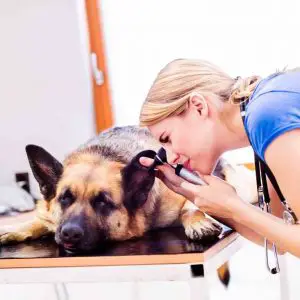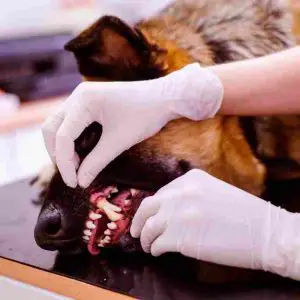
How long can a German Shepherd live? the life expectancy of a German Shepherd dog. Whether you’re currently looking at your beloved German Shepherd goofing around chasing leaves or looking at bringing a German Shepherd into your home. Knowing how long you will get to spend with your four-legged companion is something many of us feel we need to know.
So, How long can a German Shepherd live? Although there are no definitive ages German Shepherds on average, will live 11 years. In doggy years that’s an average age of 77 years. Sadly, dogs never live as long as we would like, however, compared to some other large breeds Germans Shepherds can live fairly long lives. Especially if they are kept active with a good diet and veterinary care when needed.
In the UK a study was undertaken to work out the longevity of selected breeds. (source)
This study was carried out electronically by extracting data from 92 small UK veterinary practices between 2007 – 2011. The data collected included the age of a dog when it passed away. Including both natural deaths and euthanasia. The average ages are recorded as follows:
| Breed | Average Life Span | How many Dogs | Aging from (Years) | Aging to (Years) |
| Crossbred | 13.27 Years | 965 | 10.63 | 15.22 |
| Labrador | 12.52 Years | 381 | 10.71 | 13.99 |
| Golden Retrievers | 12.48 Years | 117 | 10.99 | 13.98 |
| German Shepherd | 10.95 Years | 285 | 9 | 12.89 |
| Boxer dog | 10.03 Years | 87 | 7.54 | 11.62 |
| Rottweiler | 8.33 Years | 98 | 5.46 | 10.33 |
According to the American Kennel Club the average age for a German Shepherd in America is just 7 to 10 years old. The likely difference for this age gap is because German Shepherds in America are bred towards dog show breed standards rather than European German Shepherds who are mainly bred for their excellent working qualities. (Source)
These breed ‘standards’ require a German Shepherd to have a sloped back. With their backs being more sloped more pressure is put on the hind legs which unfortunately increases their risk of arthritis, hip dysplasia, degenerative myelopathy, and other joint and back problems.
While these issues alone won’t directly kill a dog, it can leave them in a lot of pain and reduce their mobility, which will negatively affect their quality of life. Leaving owners to make the difficult decision to euthanize them at a younger age.
For these reasons, a lot of Americans are now looking for a reputable breeder who has added European German Shepherds to their breeding programs to help reduce the likelihood of genetic problems and strengthen the breed.

Table of Contents
Why do German Shepherds not live as long as humans?
Unfortunately, current research doesn’t have a definite answer to explain why our furry companions don’t live as long as us although lots of research has suggested it may be because their bodies have to work so much harder and faster than the human body. This is evident from their growth and early milestones including:
First teeth: German Shepherds get their first set of teeth around 4 weeks
Human babies start getting their first teeth around 6 months and will keep having others arrive until they are around 33 months.
Dependants: German Shepherds are no longer dependent upon their mom’s around three months of age, whereas a human child becomes slightly less dependent upon their parents when they are three years old.
Sexual maturity: German Shepherd’s start to hit sexual maturity around 6 months of age. For human’s puberty usually starts sometime between 9 and 15 years old for boys and 7 to 13 years old for girls.
Adolescent: German Shepherds are classed as adolescents between 6 and 18 months of age. Humans between the ages of 10 and 19 years are classed as adolescents.
Adulthood: Your German Shepherd will be classed as an adult once they are 18 months +. Humans are not considered adults until they are 18 years old.
Senior: GSD are considered to be a senior once they are over 7 ½ years of age. Humans are classed as senior citizens once they hit 65 years of age.
What is the oldest age a German Shepherd can live to?
Larger dogs put more strain on their bodies naturally and no matter how well taken care of they are, on average they are unlikely to live past 13 years of age however, there have been German Shepherd dogs that have been able to defy the odds and live for much longer.
One of the longest living German Shepherds we have come across is a German Shepherd who was named Abby, she lived in Northern Canada. Abby was born on October 21, 1996, and sadly passed away on July 14, 2018, at a ripe age of 21… which is a staggering 147 years old in doggy years!! Above you can see a video of Abby when she was 20 years young.
How can I help my German Shepherd live longer?
Although life isn’t guaranteed for anyone there are ways to help give your German Shepherd amigo a better chance of longevity including:
Choose a pup from a reputable breeder
Start right from the very start by choosing your German Shepherd from a reputable breeder. German Shepherds are the second most popular breed in the US.
This demand and instant need for a German Shepherd has allowed opportunists to run back yard breeding and puppy mills to breed German Shepherds with one end goal in mind, money!
These people aren’t worried about the health of the dogs not are they interested in improving the breed in any way, shape, or form so avoiding these at all costs will not only help your German Shepherd to live longer but will hopefully save lives and the suffering of these poor animals.
Buying from a reputable breeder will ensure time has been taken to care, socialize, and observe different pups’ personalities. This helps them to be able to recommend the best puppy to fit your home.
According to the American Kennel Club the best tips for finding a reputable breeder are:
#1 – Meet the Breeder
Meeting the breeder in person is the best way to get to know them. This meeting should take place where the puppies are located, whether that is in their home or their kennel.
Both the parents and the puppies should be outgoing and not shy away from the breeder nor yourselves.
#2 – Observe
When meeting the breeder make sure you lookout for the following:
- Are the premises odor-free and clean?
- Are the dogs well-fed?
- Does the breeder seem to have a genuine passion for the dogs?
#3 – Ask questions
Both you and the breeder should be asking questions. The breeder should be asking questions to make sure that you are the best owner to provide a loving forever home for their puppies.
At the same time, they should make you feel comfortable and be knowledgable in answering any questions you may have.
#4 – Meet the parents
Meeting the parents will give you a better understanding of what your German Shepherd will be like when they grow up. Including size, appearance, and temperament.
#5 – Get details on both the pup and the parents medical history
A reputable breeder will happily show you proof of and health screenings both your pup and their parents have undertaken.
They will also advise you on any particular health conditions which can affect German Shepherd breeds and let you know what signs to watch out for.
#6 – Be patient
You shouldn’t expect to take a puppy home the same day you meet a breeder. The breeder usually will keep the puppies with their mother for the first 8 – 12 weeks. This time is critical for helping to teach your puppy good socialization skills and bite inhibition (for more information on German Shepherd bite inhibition please see this article here)
This also gives you time to prepare your home for your German Shepherd puppy. (For ways to puppy proof your home please see this article here)
#7 – Check for relevant paperwork
If your puppy is a pedigree the breeder should give you the appropriate documents to prove this before you leave the premises.

Vet checks
Regular vet checks are recommended to help catch any potential health problems early on. This will make most conditions easier to treat and in some cases, your vet can pick up any potential problems before your German Shepherd even starts to show symptoms.
It is recommended that you take your German Shepherd in for routine health checks annually although your vet may advise different time scales depending upon the needs of your Shepherd.
Weight
Dogs face the same health risks as humans when both underweight and overweight. Obesity in dogs is a growing problem. According to the Pet Obesity Prevention APOP, “55.8% of dogs are classified as overweight or obese”.
Obesity can lead to diabetes, heart disease, and cancer along with life-limiting conditions including arthritis and more common in German Shepherds, hip dysplasia.
How can you tell if your German Shepherd dog is overweight?
#1 – Can’t Feel Their Ribs
When you run your hands over your Germans shepherd you should be able to feel their ribs.
Depending upon the length of your German Shepherds coat this may be difficult to tell however if you gently push into their coat you should be able to feel their ribs.
#2 – No Definition
When viewing your German Shepherd from the side or from above while standing you should be able to see that they tuck in at the waistline.
If your German Shepherd looks like a straight furry sausage, it’s time to start dieting.
#3 – Excessive Panting
German Shepherds usually pant when they are too hot as this helps to keep them cool however, dogs can also pant when they are in pain or overweight.
Excessive panting in an overweight dog could be a sign they are struggling to get oxygenated blood to their vital systems, which will cause extra pressure on their heart.
According to this study which covered 12 different breeds of dogs “lean dogs lived on average 18-24 months longer than their littermates who ate more over their entire lives. Moreover, not only did the lean dogs live longer, they were healthier for longer as well”.
For German Shepherds, the increase in longevity was the lowest. It showed that on average leaner German Shepherds are likely to live 4 months longer than obese German Shepherd dogs.
This may not seem like a lot but any extra time we can spend with our companions is a blessing.

Diet
You are what you eat… the same can be said for our German Shepherds. To help avoid unnecessary illnesses and diseases it is important to feed your canine companion a high-quality diet.
There are six essential components which make up a healthy diet for German Shepherd including:
#1 – Water
Typically, a healthy German Shepherd requires 1 oz of water per pound of body weight. The average adult male German Shepherd weighs between 66 – 88 pounds, while the average adult female German Shepherd weighs between 48 – 70 pounds.
You GSD may need extra water if they have been exercising, is in a warm climate, or has certain health problems. For more information on how much water a German Shepherd needs please see this article here.
#2 – Protein
A healthy adult German Shepherd needs around 18% of their diet to be made up of protein.
Puppies, nursing mothers, adolescents, and senior German Shepherds will require a slight variant. For more information on how much protein a German Shepherd needs please see this article here.
#3 – Fats
A German Shepherd’s diet should contain a minimum of 5.5% fat. Fats are an important nutrient for your German Shepherd dog and play an important role in bodily functions.
Humans rely on glycogen (which is found in carbohydrates) for energy, but dogs rely on fats for energy. Fats also provide your German Shepherd with insulation and many other benefits.
Higher fat diets are needed for more active German Shepherds and those with energy-intense job roles such as police and working dogs. If you have a working dog it is likely you will need to look at working dog-specific dog foods which will have a higher fat content.
A higher fat diet is also often fed to show Shepherds as fats help to make a German Shepherds coat shinier.
Both too much and too little fat can cause health issues, so it is recommended you speak to your veterinarian before increasing their fat content too much.
According to the Veterinary Medical Center at Tufts University. Current evidence suggests that for optimal health animals need a mixture of fatty omega-6 and fatty omega-3 fatty acids.
For more information on the benefits of omega – 3 fatty acids for German Shepherds please see this article here.
#4 – Carbohydrates
German Shepherds and dogs, in general, do not have a strict requirement for carbohydrates in their diet however being omnivores they generally do well with them, and it is a good way for them to get important compounds such as fibre.
#5 – Vitamins
Vitamins are critically important for your German Shepherds body to function normally. They are generally only needed in small amounts but too little can cause serious and sometime fatal health conditions.
Vitamins help the cellular machinery in your Shepherds to breakdown fats, proteins, and carbohydrates.
Some of the vitamins your German Shepherd needs includes:
- Vitamin A: Vitamin A is an essential vitamin and must be part of your German Shepherd dog’s diet for optimal health. Muscles, nerves as well as skin and fur all require vitamin A for proper function.
- Vitamin D – Vitamin D is an essential nutrient that helps your German Shepherd regulate the balance and retention of phosphorus and calcium.
- Vitamin E – Vitamin E is essential for cell function and fat metabolism. Deficiencies can lead to eye and muscle degeneration and reproductive problems for your GSD.
- Thiamine, Vitamin B1 – Vitamin B1 is an essential vitamin for German Shepherds. Vitamin B1 helps your Shepherd’s brain and organs to function properly.
- Riboflavin, Vitamin B2 – There is high riboflavin content in eggs which plays an important role in food metabolism. As a result, your German Shepherd will easily convert food into energy. Riboflavin in combination with other minerals spearheads the formation of antibodies that are responsible for fighting off diseases and infections. This egg component also helps in iron absorption.
- Vitamin B6 – Vitamin B6 is necessary for protein synthesis and can help facilitate healthy growth in your German Shepherd. Vitamin B6 also helps to promote the production of red blood cells as well as healthy brain function. Vitamin B6 also assists with keeping your German Shepherds heart healthy
- Folic acid, Vitamin B9 – Vitamin B9 is critical to the development of healthy red blood cells. Folate helps with cataracts, helps to maintain low cholesterol levels, and also stop arteries hardening. Research just like when human women are pregnant Folate is important for the development of the fetus as it is needed for the formation of red blood cells. Vitamin B9 can also help to lower the chances of your German Shepherd having cancer.
- Vitamin B12 – Vitamin B12 which every German Shepherd needs. Vitamin B12 promotes intestinal health and the overall functioning of your dog’s brain. This vitamin also contributes to red blood cell formation. Lack of Vitamin B12 predisposes your dog to several conditions. You, therefore, risk rearing a German shepherd who is always lethargic, depressed, or overly unhappy.
- Vitamin C – Vitamin C is a vitamin that, unlike humans, dogs can produce in their bodies. Although able to produce Vitamin C natural German Shepherds still need to get a large proportion from their diet. Vitamin C is an anti-carcinogen and can help your dog fight cancers it can also naturally help your GSD fight against illnesses such as respiratory infections, kennel cough, and bacterial infections.
- Vitamin K – Vitamin K exists in two natural forms – K1 & K2, is instrumental in assisting calcium in strengthening your Shepherds’ teeth and bones. Vitamin K also assists with Osteoporosis, osteoarthritis, and can also prevent heart disease. Vitamin K can also help reduce the risk of Prostate and Liver cancer.
#6 – Minerals
Not only are minerals critical for normal muscle contractions including the heart they are also the main component of your German Shepherds bones and a component of their red blood cells.
Some minerals your German Shepherd needs includes:
- Iron – Eggs are rich in Iron, which is needed in the synthesis of hemoglobin and the functioning of different enzymes. Iron also helps in temperature regulation, which is important to your German Shepherd. You, therefore, stand to rear a lively energetic German shepherd, thanks to an increase in red blood cells.
- Selenium – Eggs contain Selenium which is important for your German Shepherd. Selenium plays a major role in cell protection by keeping your dog’s cells from getting oxidized. Just like folate, this key component found in eggs helps prevent cancer, keeping your German shepherd healthy and safe. Selenium also ensures that different parts of your dog’s body function properly. Your dog will, therefore, have improved pancreatic function, thyroid function and properly functioning hips.
- Antioxidants: Antioxidants are amazing molecules that neutralize free radicals which are created naturally by your dog’s body and stop them from harming healthy cells. Studies have shown that dogs who were fed a diet rich in antioxidants improved their body weight, lean body mass, red blood cell quality, and also decreased susceptibility to disease. The study found that dogs with an antioxidant-rich diet had a significantly longer life span.
- Zinc – Zinc plays an important role in supporting your German Shepherds immune system, it is also vital for maintaining healthy skin and fur.
- Sodium – small amounts of sodium are needed to help keep your German Shepherds cells functioning properly.
- Calcium – Calcium is an essential mineral for your German Shepherd dog. Not only does it help to support bone and teeth health, but it also helps muscles to lengthen and contract and helps to ensure their blood clots properly if needed.
- Phosphorus – the vitamin Phosphorus’s main function is to form your German Shepherds bones and teeth.
- Potassium – Potassium is the third-highest occurring mineral in German Shepherds. Potassium is essential for muscle growth and is key in improving your dog’s motor skills. Potassium also helps to boost German Shepherds metabolism by encouraging the faster absorption of nutrients. Potassium is also important in boosting cognitive function as well as promoting healthy bones and helping to maintain organ functions.
- Fiber – Fiber is great for your dog’s digestive tract and helps Fiber can help to reduce constipation and diarrhea and has also been shown to reduce the risk of Colon Cancer in dogs.
- Magnesium – Magnesium is a mineral that German Shepherds can find hard to absorb. Magnesium aids in the contraction and relaxation of muscles as well as assisting with muscle regeneration. Magnesium is also key for helping you German Shepherds liver and heart function at their best. Magnesium has also been discovered to assist with calming dogs.
- Iodine: Iodine is one of the most important trace minerals your German Shepherd can consume. Iodine is necessary for energy conversion and can assist your German Shepherd in converting their calories into energy. Iodine is also partly responsible for helping your German Shepherd to maintain healthy body cells. Iodine can assist in maintaining a healthy heart rate and boost your German Shepherds immune system. There is some research to suggest that iodine can also shrink cancer cells in dogs.
A lot of commercial dog foods are labeled as nutritionally complete however it is good to make sure that the food is high quality and doesn’t include filler ingredients such as meat by-products, corn or artificial colors, flavors, and preservatives as these contain no nutritional benefits for your German Shepherd and some of them can have a long term negative effect on your GSD’s health.
If you do feed your GSD table scraps or are considering cooking your German Shepherds meals yourself (so you know exactly what is in them) you may find our article on what human foods can, and can’t a German Shepherd eat helpful.

Dental Care
Dental health can have a big impact on your German Shepherds overall health. According to petMD: By 3 years of age over 80 % of dogs will have some form of gum disease.
The bacteria which cause this gum disease can cause both tooth loss and in some instances, it can cause organ damage by entering the bloodstream and spreading to the liver, heart, and kidneys. This damage can be permanent which will affect the lifespan of your furry companion.
To help prevent the build-up of plaque it is recommended you brush your German Shepherds teeth daily. This can be done with toothpaste specifically designed for dogs and a dog’s toothbrush which sits on the end of your finger. Alternatively, there are treats and toys available which help with dental hygiene.

Exercise
German Shepherds need to keep active for both their physical and mental health. Originally bred as working dogs they have high energy demands which need to be met. It is recommended the average German Shepherd gets 2 hours of exercise a day.
This daily exercise will help your German Shepherd maintain a healthy weight and keep fit. Exercise will also help stop them from getting bored. A bored German Shepherd can become destructive which can lead to them chewing things they shouldn’t. This could also pose a risk to their health as anything that cannot be dissolved in a dog’s stomach can cause a blockage.
Summary
How long can a German Shepherd live? If well-bred and properly exercised, German Shepherds can live into the late teens and in very rare cases early ’20s however, it is more likely they will live to be around 11 years of age.
Although we may never be able to give them the same length of life as we get, we can certainly do all we can to ensure every moment we get to spend with them is as special as our furry companions.
Are you aware of a long-lived German Shepherd? Have we got anything wrong or missed something? We’d love to hear from you. You can either write a comment below or fill in this form here.

